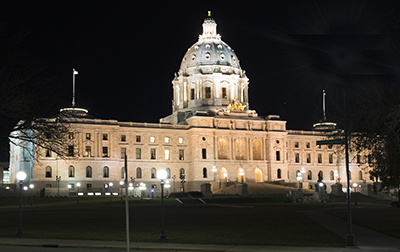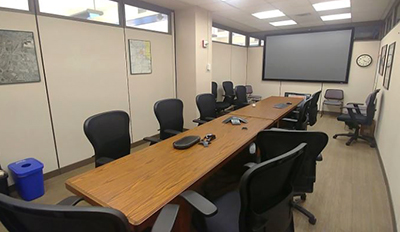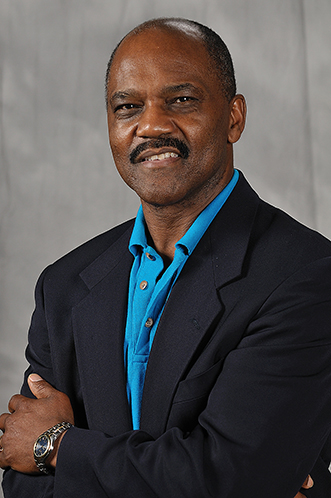 |
|

|
 |
TABLE of CONTENTS
 |
CO cafeteria serves as temporary COVID-19 testing site |

MnDOT’s Central Office cafeteria in St. Paul turned into a temporary COVID-19 testing site Jan. 25 to help relieve pressure on local medical providers due to the state’s recent surge of coronavirus cases. The site is open to the public by appointment only through Feb. 14, 7 a.m. to 4 p.m., seven days a week. The Federal Emergency Management Agency is operating the test site in coordination with the departments of Health, Administration and MnDOT. Photo by Rich Kemp |
| |
|

|
 |
TABLE of CONTENTS
 |
2022 legislative session begins |

The Minnesota State Capitol will be busy over the next few months as legislators discuss budget and policy proposals. Photo by Rich Kemp |
Minnesota state lawmakers returned to the capitol Jan. 31 to kick-off the 2022 legislative session, which will have them, among other things, deciding what to do with a projected $7.7 billion surplus.
Legislators will also address a number of funding and policy issues that will affect transportation in Minnesota.
Supplemental operating budget recommendations for MnDOT
Last week Gov. Tim Walz released his FY 2022 Supplemental Operating Budget Recommendations for MnDOT to ensure sufficient state funds to match the investment in core transportation infrastructure from the bipartisan federal Infrastructure Investment and Jobs Act. State revenues will complement this federal investment to fund crucial multimodal projects throughout the state.
As a result of IIJA, Minnesota can expect to receive approximately $4.8 billion over five years in Federal highway formula funding for highways and bridges. This represents an estimated 30 percent increase in the state’s highway formula funding under current law. The state, along with local and tribal governments, is also eligible for new and expanded competitive grant programs as part of this law. The Comprehensive Transportation Funding Package proposal offers matching funds for these mode-specific investments as MnDOT partners with the federal government, tribal governments, counties, cities, townships and multimodal systems.
Additional highlights of the other MnDOT supplemental budget recommendations include targeted one-time and base investments around the areas of climate change and system resilience, safety and system stewardship, funding for compensation operating impacts as well as other items.
Capital budget recommendations for transportation
MnDOT is putting forth a number of funding requests as part of the governor’s capital bonding bill, including:
- $80 million for investments in high-priority trunk highway bridges, including construction capital costs, project development and engineering activities.
- $120 million for the Local Bridge Replacement program, which provides grants to local governments to replace or rehabilitate small and large bridges.
- $90 million for the Local Road Improvement program, which provides grants to local governments for construction or reconstruction of local roads.
- $71.2 million for the Facilities Capital Improvement Program to maintain, expand and construct MnDOT-owned buildings across the state (e.g., truck stations and regional headquarters).
- $16.1 million for rail corridor safety infrastructure and capacity improvements between Minneapolis and Duluth, such as improving rail grade crossings. Projects would improve existing freight rail corridors and potential future passenger rail corridors.
In addition, the governor’s capital bonding bill also includes funding recommendations for Highway Railroad Grade Crossing-Warning Devices Replacement, Port Development Assistance Program, Safe Routes to School, Active Transportation infrastructure projects, Statewide Freight Safety Investments, Minnesota Rail Service Improvement Program, and the Greater Minnesota Transit Capital Program. See 2022 transportation capital budget proposals for more information.
Policy proposals
MnDOT is also proposing several policy changes to help advance the agency’s mission. The agency’s technical bill addresses several policies to help streamline operations, increase efficiencies and clarify ambiguities in several areas. In addition, MnDOT has two other policy bills—one that allows the installation of electric vehicle charging infrastructure at rest areas and another that clarifies terms associated with project selection criteria for the Corridors of Commerce program. See 2022 transportation policy proposals for more details.
For more information about the 2022 legislative proposals, contact Erik Rudeen, Government Affairs director, John Dukich, legislative relations manager, or Nick Olson, Metro District, who is on a mobility assignment with Government Affairs for the session.
For questions about the Governor’s FY 2022 supplemental operating budget or the capital budget recommendations, contact Josh Knatterud-Hubinger, budget director, or Sam Brown, assistant budget director. |
| |
|

|
 |
TABLE of CONTENTS
 |
Artist in residence pilot program applies creative lens to transportation planning |
By Joseph Palmersheim

Conference Room 820 at Central Office temporarily turned into “The Land Acknowledgment Confluence Room” as part of an exercise stemming from MnDOT’s artist in residence pilot program. The redesign, meant to show how space can encourage creativity and connection, included books and artwork about diversity and inclusion. Photos by Marcus Young

|
Marcus Young 楊墨, transportation equity fellow, recently finished his term as MnDOT’s first artist in residence, sharing his experience during a Jan. 25 webinar summing up the first two phases of the pilot program.
“MnDOT has been very welcoming and open-minded about trying new things,” Young said. “The work of finding how art and related creative practices can serve MnDOT and those that MnDOT serves is definitely a challenge. But it’s a challenge worth the persistence beyond these initial years. If any agency can make a difference and show the way for others, it’s here in Minnesota.”
Projects highlighted during the Jan. 25 presentation included an “I Dream of a Wild ___” exercise during the Oct. 11-12 Managers’ Workshop, and the “The Land Acknowledgment Confluence Room,” a redesign of conference room 802 at Central Office.
“It’s less about what I’ve worked on and more how we’ve worked together,” Young said. “I am grateful for the conversations I’ve been a part of and the ideas that have emerged. The concept of a ‘Department for the Freedom of Movement’ came out of conversation. So did the Land Acknowledgment Confluence Room, and other realized and yet-to-be realized projects.”
Jessica Oh, strategic partnerships director, Sustainability and Public Health Division, said Young’s work connected MnDOT with people-centered approaches to doing business.
“He’s helped us dream of possible futures in transportation,” Oh said. “He’s been able to interject creativity with trying to address some of our pressing problems, and applying a creative lens to a planning process. It’s about bringing in different voices into the transportation process.”
Young will return for two workshops in April about making MnDOT more people-centered.
“I can’t say I’m the best judge, but I’m guessing MnDOT is more reliable than it is dynamic, more technical than expressive,” Young said. “I think MnDOT is better when it’s both. This partnership with the arts can help with new understanding in a fast-changing world. It cultivates our human qualities toward empathy, equity and belonging. The arts can see potential in everyone, and the possibility for change in everything we do.”
MnDOT will partner with a new artist this spring for the third phase of the pilot project. Oh said the project’s year three vision is to work with an artist “who can assist MnDOT in finding creative approaches to achieving sustainability, public health and greenhouse gas reduction goals.” |
| |
|

|
 |
TABLE of CONTENTS
 |
Series of online events mark Black History Month |
|
By Jesse Johnson
The African American Employee Resource Group invites all MnDOT employees to a series of online Lunch and Learns to celebrate Black History Month.
- Feb. 3 (noon to 1 p.m.) – The Minnesota Paradox (Transportation Equity presentation) – Dr. Sam Myers from the University of Minnesota will discuss how racial disparities have resulted from policies that were designed to be racially neutral or racially blind. The Minnesota Paradox, a term coined by Dr. Myers, highlights how the Twin Cities is often ranked as one of the most prosperous places to live, yet conversely has some of the worst racial disparities in the country.
- Feb. 7 (noon to 1 p.m.) – Racial Covenants in Housing Deeds – Maria Cisneros and Kiarra Zackery from Just Deeds will discuss discriminatory covenants that once kept people of color from buying houses in certain Minnesota neighborhoods. The result is a century of segregated communities. Just Deeds is a coalition dedicated to discharging these covenants by removing discriminatory language from property titles.
-

Dr. Ernest Lloyd, former MnDOT employee, will participate in a personal conversation as part of a Lunch and Learn to celebrate Black History Month. Submitted photo |
Feb. 22 (noon to 1 p.m.) – Highway of Truth Telling – Tesfa Wondemagegnehu, assistant professor of music at St. Olaf College, will talk about his 60-day, 9,000-mile journey across the United States he took in his Prius. His presentation will highlight stories of the people he met while traveling, and the potential for reconciliation through action.
- Feb. 25 (noon to 1:30 p.m.) – Personal conversation with Dr. Ernest Lloyd – The Equity and Justice Black Caucus, a statewide employee resource group, will host a personal conversation with Dr. Ernest Lloyd, a former MnDOT employee who completed his dissertation work at Hamline University on the impact of Interstate 35W on communities in South Minneapolis.
The AAERG will also host a Lunch and Learn with Dr. Lloyd about his dissertation on March 30.
Learn more about the AAERG. If you’re not an AAERG member or ally and would like to join, contact Frida Alvarez at frida.alvarez@state.mn.us.
|
| |
|

|
 |
TABLE of CONTENTS
 |
Tori Nill moving to District 7 as assistant district engineer |

Tori Nill is the assistant district engineer for construction in District 7. Photo by Rich Kemp |
Tori Nill is serving in a mobility position as assistant district engineer for construction in District 7. She started in the position Jan. 31 and will serve through December 2022.
Nill replaces Roger Risser, who is scheduled to retire in May. She will lead the district’s east and west resident construction offices, as well as areas of construction operation including bridge and land management. Risser has worked for MnDOT for eight years, the last four in his current position.
Nill has more than 20 years of experience with MnDOT, working in pre-design, final design, traffic and transit.
She also served for one year as acting district engineer for District 4. Most recently, she served as the Director of the Office of Transit and Active Transportation in Central Office. Prior to MnDOT, Nill worked in municipal design for Howard Green and HNTB.
|
| |
|

|
 |
TABLE of CONTENTS
 |
MnDOT's social media performance grows in 2021 |
MnDOT’s social media content grew across all platforms in 2021. MnDOT has accounts on Facebook, Instagram, Twitter and LinkedIn. The Facebook, Twitter and Instagram pages increased their followers considerably in 2021:
- Facebook followers: 123.2K
- Twitter followers: 57.8K
- Instagram followers: 8.3K
More than 59 percent of the Facebook followers were women and the 35-44 age group had the most Facebook and Instagram followers.
In 2021, MnDOT reached:
- 7,211,416 people on Facebook
- 327,142 people on Instagram
The device most used by MnDOT social media users were iPhones.
MnDOT was able to run ads on social media to increase the reach of posts and to target specific users. By running 200 ads in 2021, the posts were able to reach 1,978,689 people.
The top post for the year was the MnDOT Minute ‘Ice Breaker’ Facebook post that reached 1.8 million people. The top tweet was the announcement of the winners of the ‘Snowplow Naming Contest’ with 4.15 million impressions.
|
| |
|

|
 |
TABLE of CONTENTS
 |
Betty Whiteout, The Big Leplowski are among winners in 2022 “Name a Snowplow” contest |
By Anne Meyer
Plowy McPlowFace has eight new friends, including Betty Whiteout and Ctrl Salt Delete, joining the state’s snow fighting fleet. After plowing through nearly 60,000 votes. MnDOT announced the winners of its second “Name a Snowplow” contest Feb. 3. One newly named snowplow will be assigned to each of MnDOT’s eight districts later this month.
The winning names, in order of vote totals, and their future homes are:
- Betty Whiteout – District 8
- Ctrl Salt Delete – District 7
- The Big Leplowski – District 4
- Plowasaurus Rex – Metro District
- Scoop Dogg – District 3
- Blizzard of Oz – District 2
- No More Mr. Ice Guy – District 1
- Edward Blizzardhands – District 6
Tallies for all 50 finalists can be found here.
In December 2021, MnDOT invited people to submit creative ideas for snowplow names. After receiving more than 22,000 name ideas, agency staff narrowed the list and selected 50 finalists for the public to vote on. These 50 names were determined by considering several factors, including how creative or unique the name was, whether it would be understandable or identifiable to broad audiences, and the frequency of submissions.
MnDOT will share additional information on its social media pages once the names are placed on the snowplows. |
| |
|
| |
|



